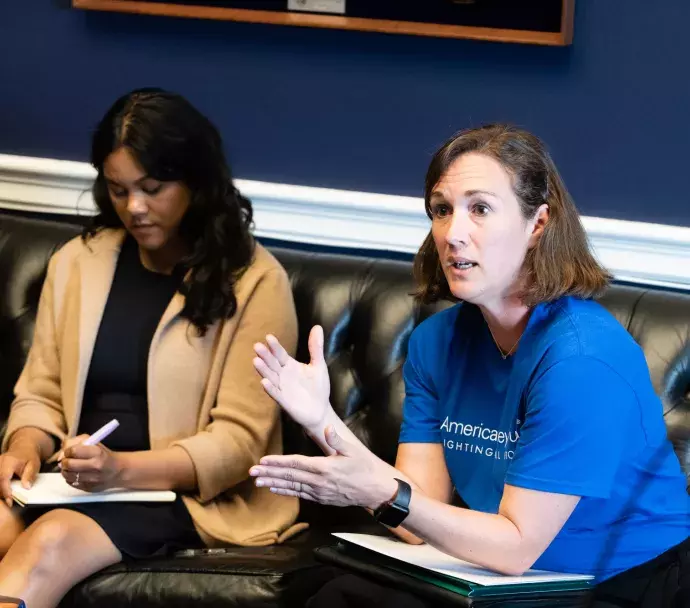
Our 2025 Policy Priorities
We are a strong and independent voice advocating for policies that improve access to health care and that strengthen the quality of care for patients with kidney disease. Learn more about our 2025 policy priorities.

American Kidney Fund policy agenda
The American Kidney Fund (AKF) fights kidney disease on all fronts as the nation's leading kidney nonprofit. AKF works on behalf of the 1 in 7 American adults living with kidney disease, and the millions more at risk, with an unmatched scope of programs that support people wherever they are in their fight against kidney disease — from prevention through transplant. Through programs of prevention, early detection, financial support, disease management, clinical research, innovation and advocacy, no kidney organization impacts more lives than AKF. AKF is one of the nation's top-rated nonprofits, investing 96 cents of every donated dollar in programs, and holds the highest 4-Star rating from Charity Navigator and the Platinum Seal of Transparency from GuideStar.
We are a strong and independent voice advocating for policies that improve access to health care and that strengthen quality of care for Americans living with kidney disease. We work with Congress, the Administration, federal agencies, and state governments to make kidney disease a national priority.
AKF partners with many other advocacy groups to achieve policy priorities. In many instances, AKF will advocate for policies directly; in other cases, we will support the efforts of other advocacy organizations.
The folowing is AKF's policy agenda for 2025.

Protecting and enhancing access to health coverage under the Affordable Care Act, Medicaid, and employer-sponsored insurance
The issue: The elimination of preexisting condition exclusions for health insurance under the Affordable Care Act (ACA) has enabled people with chronic diseases, including kidney disease, to enroll in private commercial health plans that provide comprehensive coverage. Medicaid, which provides health coverage for one in five low-income individuals, plays a vital role in helping enrollees prevent and manage chronic conditions such as chronic kidney disease and its leading causes, diabetes, and hypertension. However, access to affordable, comprehensive coverage for many Americans has been threatened at various points over the years due to certain administrative actions and legislative proposals.
To protect and enhance access to affordable, comprehensive coverage for people with chronic conditions such as kidney disease, AKF supports policies that would:
- Uphold the core statutory objective of the Medicaid program, which is "to furnish medical assistance [to individuals] whose income and resources are insufficient to meet the cost of necessary medical services."
- Protect Medicaid funding and patient access to benefits. Therefore, we oppose policies that would cut funding and create administrative barriers to enrolling in coverage and accessing needed health care, including Medicaid work requirements, block grants and per capita caps, elimination or reduction of the Medicaid expansion matching rate, elimination or reduction of the minimum matching rate, elimination or restriction of state use of provider taxes, and policies that make it harder to enroll or re-enroll in coverage.
- Address the coverage gap for individuals who are ineligible for Medicaid because they live in states that did not expand Medicaid coverage under the ACA but are also ineligible for ACA premium tax credits because they have incomes below poverty.
- Strengthen the ACA Marketplace by adequately funding ACA enrollment and outreach activities, reinsurance programs, making permanent the enhanced ACA premium tax credits.
- Ensure the integrity of the ACA essential health benefit (EHB) requirements to safeguard patient access to comprehensive benefits and lifesaving services and treatments such as chronic kidney disease management, dialysis treatment, and kidney transplantation.
- Ensure strong network adequacy standards for qualified health plans on the ACA Marketplace, which is critical for advancing health equity and enhancing patient access to quality, affordable care.
- Implement regulations that mitigate the expansion of less comprehensive insurance options, such as association health plans and short-term limited duration plans, which are exempt from covering the essential health benefits or can deny or limit coverage for people with preexisting conditions.

Improving early detection of kidney disease and addressing the unknown causes of kidney disease, including rare kidney diseases
The issue: Although 1 in 7 American adults are living with chronic kidney disease (CKD), most of them do not know it because it has no symptoms in the early stages. Millions more individuals are at risk of developing kidney disease and are not aware of their risks. Anyone can get kidney disease, but some people are more at risk than others. Diabetes and high blood pressure are the most common causes of kidney disease. Having a family history of kidney disease, being over age 60 and being of a certain race or ethnicity can also increase an individual's risk for kidney disease. However, for a number of people living with kidney disease, the cause of their kidney disease is unknown. Identifying the root cause of a person's kidney disease, both early in the disease and as a life-preserving necessity, is important for making crucial treatment decisions.
To improve the early detection of kidney disease and address the unknown causes of kidney disease, including rare kidney diseases, AKF supports policies that would:
- Expand the use of CKD screening to diagnose CKD in individuals as early as possible so they can begin to manage their disease and slow its progression, which could lead to better health outcomes for populations disproportionately impacted by kidney disease. As an important first step, we encourage the U.S. Preventive Services Task Force to develop a CKD screening recommendation.
- Increase access and expand coverage of genetic testing and counseling, particularly in public programs, for people living with kidney disease, which will help provide answers to patients seeking to understand the cause of their kidney disease. Having a clear diagnosis and identifying the root cause of a person's kidney disease will help patients and providers develop appropriate treatment plans that are tailored to the patient's specific needs. A clear diagnosis also allows people living with kidney disease to be informed of any genetic based susceptibility for family members.
- Establish national genetic testing and counseling standards for kidney disease through stakeholder collaboration and a consensus-driven, iterative process. Establishing national standards and cohesive guidelines will help ensure high quality care is consistently provided to all people living with kidney disease.
- Increase awareness and resources for rare kidney disease to improve clinical research, provider training, diagnosis, prevention, and treatment of rare kidney disease. Certain rare kidney diseases do not have any approved treatments and inevitably lead to kidney failure. Rare kidney diseases also disproportionately affect communities of color, particularly Black Americans. More resources are needed to improve early diagnosis, better understand ways to slow the progression of rare kidney disease and improve treatments for rare kidney disease.
- Develop a voluntary multi-payer payment model that incentivizes payers and providers to improve early detection of CKD and upstream care that results in better management of CKD, slower disease progression, and better health outcomes.

Encouraging organ donation and supporting kidney transplants
The issue: Kidney transplantation is considered the best treatment option for people facing kidney failure because it can increase their chances of living a longer, healthier life. However, the number of people on the organ transplant waiting list is great — about 105,000 Americans are on the list, with 86 percent of those in need of a kidney. Many will die before they receive one because of the dire shortage of kidneys for transplant.
To encourage organ donation and increase kidney transplants, AKF supports:
- Federal legislation, such as the Living Donor Protection Act, that encourages organ donation and protects living organ donors from discrimination when seeking life, disability and long-term care insurance. It would also codify that living organ donors may use Family and Medical Leave time to recover from donation surgery and maintain job security.
- State legislation that provides tax breaks to living donors and employers who provide paid leave, as well as state legislation that mirrors the federal Living Donor Protection Act.
- Legislation and regulatory actions to improve and modernize the Organ Procurement and Transplantation Network (OPTN) to ensure all stakeholders — including providers, organ procurement organizations, transplant centers, and OPTN contractors — are working in concert to ensure quality patient care, maximized organ supply, and equitable organ allocation.
- Appropriate implementation of the Medicare Part B Immunosuppressive Drug benefit (Part B-ID) for kidney transplant recipients whose Medicare coverage has ended 36 months after receiving their kidney and who are not currently enrolled in other health coverage and do not expect to enroll in other health coverage.

Ensuring access to high quality, patient-centered care for Medicare beneficiaries with kidney disease
The issue: As the Medicare benefit continues to evolve for ESRD beneficiaries and people with earlier stages of chronic kidney disease, access to coverage options, supporting patient choice in treatment options, supporting innovation, and improving care quality and patient education must be at the center.
To ensure access to high quality, patient-centered care for Medicare beneficiaries with kidney disease, AKF supports policies that would:
- Include coverage of kidney disease screening in the Medicare wellness visit.
- Expand access to the Medicare Kidney Disease Education benefit, which provides education to patients on how to take the best possible care of their kidneys and the information they need to make informed decisions about their care.
- Ensure the long-term adoption of innovative treatments in the Medicare ESRD Prospective Payment System (PPS), particularly innovative drugs, equipment and supplies that have been made available to beneficiaries through the transitional drug add-on payment adjustment (TDAPA) and the transitional add-on payment adjustment for new and innovative equipment and supplies (TPNIES).
- Ensure appropriate payment in the Medicare ESRD PPS that accurately reflects the rising costs of labor, supplies and equipment. This is critical to ensure patient access to providers and to ensure facilities can hire and retain the qualified health care professionals that are needed to provide quality care.
- Ensure Medicare ESRD beneficiaries who want to enroll in a Medicare Advantage (MA) plan have access to needed services, treatments, and providers. Particularly, federal policies should ensure MA enrollees with ESRD have access to adequate provider networks; access to innovative drugs and devices that are available to ESRD beneficiaries in traditional Medicare; and that MA enrollees do not encounter access barriers to necessary treatments due to burdensome prior authorization requirements.
- Implement certain telehealth flexibilities for Medicare beneficiaries, such as amending geographic and originating site requirements, while preserving patient choice and ensuring telehealth is used as a clinically appropriate supplement to accessing in-person care.
- Ensure mandatory payment models such as the ESRD Treatment Choices (ETC) Model and voluntary Kidney Care Choices payment models preserve or enhance the quality of care and the patient experience and supports a patient in choosing a modality that is clinically appropriate for their health needs.
- Ensure quality measurement that has the patient perspective in mind, and that furthers the goals of improving patient care, experience, and outcomes

Addressing health disparities that impact people with kidney disease
The issue: There are longstanding health disparities in the U.S. — differences in health outcomes and health care among groups of people related to their race, ethnicity, age, disability, gender, geographic location, socioeconomic status and sexual orientation. Kidney failure (end-stage renal disease or ESRD) disproportionately impacts minority populations: Black Americans make up about 13 percent of the U.S. population, but they account for 30 percent of Americans with kidney failure and are nearly 4 times more likely than white Americans to develop kidney failure. Native Americans and people of Hispanic ethnicity are more than 2 times, and Asian Americans 1.4 times, more likely than white Americans to develop kidney failure.
To address health disparities and ensure all individuals have the opportunity to be as healthy as possible, AKF advocates for policies that will:
- Address the social determinants of health (SDOH), which are the conditions in the environments where people are born, live, learn, work, play, worship, and age that affect a wide range of health, functioning, and quality-of-life outcomes and risks. SDOH include income level, educational and job opportunities, access to housing and utility services, workplace safety, gender inequity, racial segregation, food insecurity, early childhood experiences, and exposure to violence and pollution.
- Ensure equitable access to affordable and comprehensive health insurance coverage.
- Enforce federal protections against discrimination in the provision and administration of health insurance coverage, including discriminatory benefit design.
- Improve the health care delivery system to make it more equitable, accessible and inclusive, and to ensure high quality care across demographics and geographic regions, including rural and urban areas.
- Conduct research on kidney disease in communities of color, rural communities and underserved communities. Ensure equitable access to all ESRD treatment modalities, including transplantation and home dialysis, across racial, ethnic, and socioeconomic populations and geographic regions to support treatment choice that is clinically appropriate for a person's health needs and their individual circumstances.
- Improve diversity in clinical trials to ensure participants are reflective of the populations that are most impacted by specific diseases and conditions.
- Mandate that insurers must accept health insurance premiums from charities, as these programs help underserved communities who are more likely to be uninsured.
- Ensure proper training for health professionals to recognize and address implicit and conscious bias and to provide culturally appropriate care.

Ensuring adequate funding for kidney research and promoting innovation
The issue: Kidney disease affects 1 in 7 American adults — far more than many other diseases. Yet federally funded research for kidney disease has lagged compared with many other diseases. This has slowed innovation in the diagnosis and treatment of a disease that is the fastest-growing noncommunicable disease in the United States.
To advance kidney disease research and promote innovation in kidney care, AKF supports efforts to:
- Increase appropriations funding for the National Institute of Diabetes, Digestive and Kidney Disease (NIDDK), which is a part of the National Institutes of Health (NIH). NIDDK conducts and supports medical research and research training and disseminates science-based information on kidney diseases.
- Increase funding for the Centers for Disease Control and Prevention's (CDC) Chronic Kidney Disease Initiative, which is designed to provide public health strategies for promoting kidney health.
- Increase funding for KidneyX, the Kidney Innovation Accelerator Program, a public-private partnership to accelerate innovation in preventing, diagnosing and treating kidney diseases.
- Ensure the U.S. Food and Drug Administration's (FDA) development and approval process for drugs and medical devices is appropriately structured and resourced to facilitate patient access to innovative, safe, and effective treatments.

Supporting Medigap reform
The issue: Most people with ESRD are eligible for Medicare even if they are under 65. But 17 states do not require health insurers to offer private supplemental Medigap plans to these younger Medicare beneficiaries. Without Medigap, ESRD Medicare beneficiaries face daunting out-of-pocket expenses for the 20% of medical care not covered by Medicare Part B and that is not subject to an out-of-pocket cap. Additionally, ESRD Medicare beneficiaries are required to have supplemental insurance in order to be added to the kidney transplant waiting list, as Medicare alone is not considered full coverage by transplant centers across the nation. Without access to Medigap plans, many ESRD Medicare beneficiaries under 65 cannot access kidney transplantation.
To protect people living with ESRD who do not have access to Medigap, AKF supports:
- Federal legislation that would ensure guaranteed availability of Medigap supplemental insurance to all Medicare ESRD beneficiaries, regardless of age.
- State legislation that would require insurance companies that offer Medigap coverage to make it available to Medicare ESRD beneficiaries under 65 and that would place limits on the premiums charged to Medicare ESRD beneficiaries so that Medigap is affordable.

Fighting insurance discrimination against people living with ESRD
The issue: Health insurers systematically discriminate against low-income people living with ESRD who rely on charitable assistance to afford their health insurance premiums and access the health care they need to stay alive. Over the years, many insurance carriers have refused charitable premium assistance payments from AKF on behalf of people living with ESRD. These people living with ESRD, who are disproportionately members of racial and ethnic minorities, depend on AKF's federally-approved, 100% needs-based Health Insurance Premium Program (HIPP) to afford the premiums for their Medicare Part B, Medigap, Medicare Advantage, employer group health, COBRA and other commercial plans, including Qualified Health Plans (QHPs).
Additionally, a recent U.S. Supreme Court decision has put in jeopardy access to private health coverage that people living with ESRD are entitled to under the Medicare Secondary Payer Act (MSPA), which has been the law since 1980. Under the MSPA, people with ESRD have the option to keep their private health insurance as their primary coverage for 30 months before transitioning to Medicare. This law protects ESRD patients from discriminatory practices by insurers that would discourage their enrollment in a private plan. However, the court's decision will now enable employer-based group health plans to carve out critical kidney care services — including dialysis treatments and access to nephrologists — from their coverage, effectively allowing insurers to push people with ESRD off their private plan.
To protect access to health coverage and protect people living with ESRD from insurance discrimination, AKF supports:
- Federal and state regulation that would ensure insurance carriers accept charitable payments on behalf of people living with ESRD.
- Federal and state legislation that would protect patient access to coverage by requiring insurance companies to accept payments from nonprofit charitable organizations like AKF.
- Federal legislation that would restore the MSPA's protections and prohibit insurers from discriminating against people living with ESRD.

Protecting patient access to needed medications; supporting lower prescription drug costs for patients; and encouraging innovation in drug and biopharmaceutical development
The issue: Access to medically appropriate prescription drugs for people living with kidney disease must be preserved amid federal efforts to address the rising cost of prescription drugs. People with chronic kidney disease, kidney failure and kidney transplants rely on prescription drugs to manage their kidney disease and comorbidities. People need access to medically appropriate prescription drugs that are effective and right for their individual situation, and they must be able to afford them.
To protect patient access to needed medications, avoid disruptions to stable drug regimens, and support lower prescription drug costs for patients, AKF supports:
- Appropriate implementation of the restructuring of the Medicare Part D benefit, particularly the expansion of the Part D low-income subsidy (LIS) and implementation of a true out-of-pocket cap for beneficiaries and the Medicare Prescription Payment Plan.
- Policies that would result in lower drug costs and lower out-of-pocket costs for patients, including policies that protect a patient's ability to use drug copay assistance to afford needed medications, and to have that assistance count towards their annual deductible and out-of-pocket spending cap.
- Efforts to drive greater innovation in kidney care and to encourage the development of new products that can improve the treatment of kidney disease, specifically the transitional drug add-on payment adjustment (TDAPA) and the transitional add-on payment adjustment for new and innovative equipment and supplies (TPNIES)
- Efforts that encourage the introduction and availability of generic prescription drugs and biosimilars, while maintaining effective safeguards to ensure that patients for whom generic substitution is not medically appropriate still have access to branded drugs that are part of their stable drug regimen. AKF supports maintaining patient access to prescription drugs in the Medicare Part D program as it relates to the six categories and classes of drugs of clinical concern (the six protected classes), which includes immunosuppressive drugs for treatment of transplant rejection.
- Pharmacy benefit manager (PBM) reforms that would reduce patient cost-sharing for prescription drugs, ensure patients share in the savings from rebates received by PBMs, and increase transparency on PBM practices and contracts.

Ensuring the use of clinical algorithms and artificial intelligence in health care benefits patients and protects them from adverse impacts
The issue: Clinical algorithms and artificial intelligence (AI) are increasingly being used in the health care system with a significant impact on patients. The use of probability-based algorithms such as those used in AI and machine learning approaches have the potential to improve care and health outcomes, particularly for people with and at risk for kidney disease. For example, AI has the potential to improve the accuracy and timeliness of diagnoses and improve the early detection of kidney disease; help predict the progression of kidney disease, which can lead to improvements in disease management and slowing its progression; and help improve provider workflows and accelerate research and development pathways.
However, AI also has risks that can have adverse impacts on patients. Examples include the use of AI technology to automate the denial of coverage by insurers, and algorithms used in AI that contain biases that perpetuate health inequities which have disproportionately harmed historically marginalized communities.
As the use of AI in health care evolves in terms of technological advances and the development of public policy, AKF supports the following principles to help ensure patients benefit from the responsible use of AI and to minimize potential risk:
- The development of AI tools and AI public policy should be patient-centered, with patient interests, concerns and perspectives at the forefront, and patient engagement throughout the process.
- The use of AI in health care should advance health equity and not perpetuate health disparities. Addressing bias in algorithms must be a priority throughout the development of AI tools and the crafting of AI policies.
- Ensuring patient safety and protecting patient privacy through appropriate safeguards must be priorities in the development of AI tools and AI policies.
- The use of AI technology in health care should help support clinical decision-making, but it should not replace decisions made by humans that result from clinician knowledge and patient engagement.

Utilizing nutrition as a way to prevent and manage chronic diseases
The issue: Dietary interventions have been shown to be successful in managing and improving symptoms of chronic diseases such as heart disease, diabetes, and kidney disease.[1],[2]Nutritious food promotes good health. Access to fresh fruits, vegetables, and lean proteins can provide families and children alternatives to processed foods that have been linked to obesity, metabolic disease and low levels of HDL (high-density lipoprotein or "good" cholesterol).[3]
As part of prevention and management of kidney disease, AKF supports:
- Expanding current Medicare coverage for medical nutrition therapy (MNT), which is nutrition related diagnostic, therapeutic and counseling services provided by a registered dietitian nutritionist. This intervention has been found cost-effective and successful for preventing and managing chronic illnesses.[4] Medicare currently covers MNT for people with diabetes or a renal disease. AKF supports expanding MNT under Medicare to include prediabetes, hypertension, and other illnesses that can be improved with nutrition.
- Improving access to non-processed groceries, such as initiatives to encourage the development of grocery stores that carry fresh fruit and vegetables in "food deserts," and tax credits and grants for businesses who serve low-income urban and rural areas. The U.S. Department of Agriculture defines a food desert as "a low-income tract where a substantial number or substantial share of residents does not have easy access to a supermarket or large grocery store."
- Enhancing policies that provide free delivery of groceries to people who live in "food deserts." Low-income people on dialysis and those with CKD, diabetes, pre-diabetes, or hypertension who live in food deserts would benefit from having nutritious food delivered. The 2018 Farm Bill included a national Online Purchase Pilot which provided SNAP beneficiaries' access to grocery delivery services. In urban areas, 5.9% were "non-deliverable." In rural areas, 69.5% were "non-deliverable."[5]

Our Legislative Priorities
Several important pieces of legislation have been introduced in the current Congress, and we are actively working to enact these bills that would affect kidney patients and their access to life-sustaining health care.


I am a solo home dialyzor for the past 6 years. Thanks to advocacy and learning about home dialysis I am healthier than I have ever been, despite being on dialysis
-AKF Ambassador, Nieltje Gedney

Keeping the memory alive
Fundraise for AKF
“I wanted to do something to honor my mom, and loved that my fundraiser could help kids with kidney disease go to summer camp.” -Jose Ortiz, KidneyNation fundraiser
Support AKF anywhere, anytime — and have fun while doing it! Join an AKF 37 Mile Challenge. Pledge your birthday. Or create a fundraiser that's unique to you. We are here to support you along the way.

